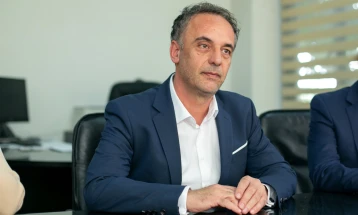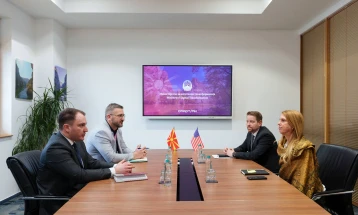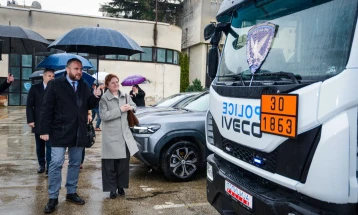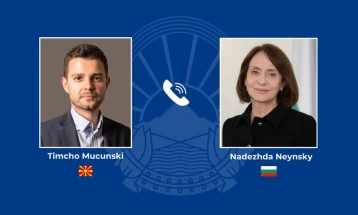Country to protect national interests without deviating from EU membership goal, but also by strengthening US relations: conference
- Minister of Foreign Affairs and Foreign Trade Timcho Mucunski stressed the necessity to continue working with the country’s allies and partners “to build a more just, sustainable and lasting international order”, in his address Thursday at the "Euro-Atlantic Security Dynamics: Challenges for NATO, Europe, and the Enlargement Process of the Western Balkans" panel discussion hosted by Konrad Adenauer Foundation (KAS) and the Faculty of Philosophy at the Ss. Cyril and Methodius University.
- Post By Angel Dimoski
- 16:45, 6 March, 2025
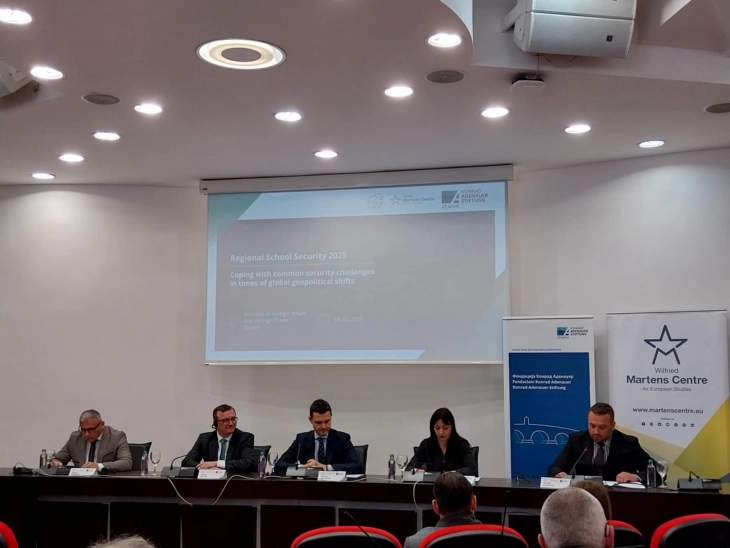
Skopje, 6 March 2025 (MIA) - Minister of Foreign Affairs and Foreign Trade Timcho Mucunski stressed the necessity to continue working with the country’s allies and partners “to build a more just, sustainable and lasting international order”, in his address Thursday at the "Euro-Atlantic Security Dynamics: Challenges for NATO, Europe, and the Enlargement Process of the Western Balkans" panel discussion hosted by Konrad Adenauer Foundation (KAS) and the Faculty of Philosophy at the Ss. Cyril and Methodius University.
“I believe that only through joint efforts and by demonstrating unity can we create an environment in which all countries will have the opportunity to promote their positions and share their concerns. This is why our commitment is directed at the enhancement of international cooperation founded on mutual understanding and respect, but also the preservation of our shared values,” Mucunski said.
The Foreign Minister spoke about increased security challenges and modern threats “including hybrid and cyberattacks, disinformation, as well as economic coercion and the use of energy resources as a weapon to pressure and blackmail”.
“We believe that building the resilience of societies by strengthening our institutions, through a comprehensive social approach, represents an appropriate response. The security and stability of our country is inextricably linked to the security and stability and development of the entire Western Balkans. Our commitment is the contribution to the strengthening of regional cooperation, through a mechanism that will ensure a place in the European and Euro-Atlantic family for the countries of the region,” Mucunski said.
Vasko Naumovski, professor at the Iustinianus Primus Faculty of Law in Skopje, former Deputy Prime Minister for European affairs and former Ambassador to the United States, said the dilemmas that have arisen in the country in recent weeks are related to the differing positions on global issues that the country’s traditional partners have.
“We are trying to lead a more autonomous long-term policy, and in our context, we need to be especially careful in our relations with the EU member states and in our relations with the EU as a structure, while also maintaining our good bilateral relations with the US and deepening them,” Naumovski said.
Naumovski stressed that the country needs to continue to deepen its bilateral relations with the United States in the economy as well, while also meeting EU membership criteria in order to progress in the accession process.

Marjan Gjurovski, professor at the Faculty of Philosophy highlighted the need for a dialogue between the Government and the opposition, as well as consultations with academia, to discuss the country’s foreign policy in the context of the geopolitical changes.
“The strategic partnership with the US is a Macedonian national interest and this should be our starting point and something that we should go back to when necessary. The strategic partnership with the US should be essential for our security and development in the years to come, and we also need to participate in the Euro-integration processes and Europe especially in the areas of the economy, trade, security and defense. We are a part of Europe and there is no reason why we should provide additional confirmation of this or say that by accepting the US resolution on Ukraine in the UN we’ve changed our policy. The decision made is a sovereign right of the Macedonian country,” Gjurovski said.
Katerina Jakimovska from the Brussels-based Wilfried Martens Centre for European Studies stressed "we are living in a rapidly changed world that is not the same as the one from a few weeks ago".
“The exceptionally intense press conference in the Oval Office last week cleared up certain dilemmas that arose during the Munich Security Conference following the speech by the US Vice President, JD Vance – the US no longer wants to be an ally of the EU. It is up to the Union to act quickly now and consolidate its positions. Otherwise, it risks becoming a marginal actor in the new global order. It is clear that the new geopolitical changes impose a repositioning of the countries in the region, especially after the continued disappointment over the European integration. Where is the Balkans in this complex framework – the deferred European future creates gaps that third actors will be quick to fill. I want to note that as a part of a region that is a part of historical revisionism, we can’t know for sure whose ideas will re-emerge and be backed,” Jakimovska said.
The Dean of the Faculty of Philosophy at the Ss. Cyril and Methodius University, Oliver Bakrevski, highlighted the need for greater cooperation between the countries to overcome security challenges in the current geopolitical context, “since they are unable to be the sole guarantors of their own security”.
Konrad Adenauer Foundation representative Daniel Braun highlighted that the winner of the German elections, CDU leader Friedrich Merz, following the incident in Oval Room spoke against having the wrong impression about who is the aggressor and who is the victim in the conflict between Russia and Ukraine.
According to Braun, Germany is ready to take more responsibility in the new geopolitical developments and would also like to ask other EU and NATO partners to do the same.
“Europe and Germany are a powerful economic force, and with the new tariffs that we are facing from the US, it will be a wake-up call for joint positions to tackle all these challenges. Perhaps this new situation will grant us strength and power to overcome bilateral issues,” Braun said.
Photo: MIA


